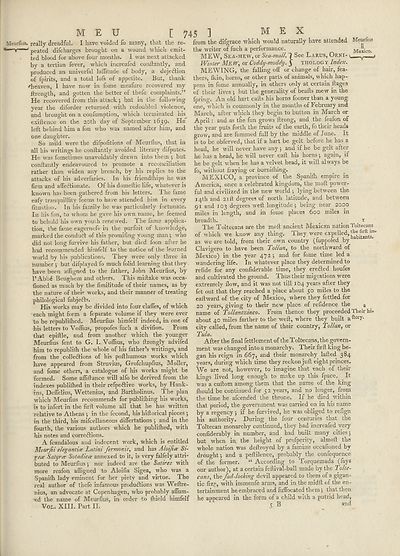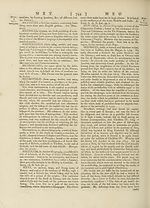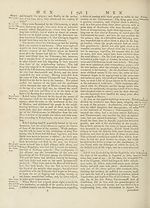Encyclopaedia Britannica, or, a Dictionary of arts, sciences, and miscellaneous literature : enlarged and improved. Illustrated with nearly six hundred engravings > Volume 13, MAT-MIC
(791) Page 745 - MEU
Download files
Complete book:
Individual page:
Thumbnail gallery: Grid view | List view

M E U
[ 745 ]
M E X
Meurfius. really dreadful. I have voided fo many, that the re-
peated difcharges brought on a wound which emit¬
ted blood for above four months. I was next attacked
by a tertian fever, which increafed conftantly, and
produced an univerfal lailkude of body, a dejection
of fpirits, and a total lofs of appetite. But, thank
'heaven, 1 have now in fome meafure recovered my
ftrength, and gotten the better of thefe complaints.”
He recovered from this attack 5 but in the following
year the diforder returned with redoubled violence,
and brought on a confumption, which terminated his
exiftence on the 20th day of September 1639. He"
left behind him a fon who was named after him, and
one daughter.
So mild were the difpoiitions of Meurlius, that in
all his writings he conftantly avoided literary dilputes.
He was fometimes unavoidably drawn into them •, but
conftantly endeavoured to promote a reconciliation
rather than widen any breach, by his replies to the
attacks of his adverfaries. In his friendftiips he was
firm and affectionate. Of his domeftic life, whatever is
known has been gathered from his letters. The fame
eafy tranquillity feems to have attended him in every
fituation. In his family he was particularly fortunate.
In his fon, to whom he gave his own name, he feemed
to behold his own youth renewed. The fame applica¬
tion, the fame eagernefs in the purfuit of knowledge,
marked the conduCl of this promiiing young man ; who
did not long furvive his father, but died foon after he
had recommended himfelf to the notice of the learned
world by his publications. They were only three in
number 5 but difplayed fo much folid learning that they
have been aftigned to the father, John Meurfius, by
1’Abbe Beughem and others. This miftake rvas occa-
fioned as much by the fimilitude of their names, as by
the nature of their works, and their manner of treating
philological fubjedts.
His works may be divided into four claffes, of which
each might form a feparate volume if they were ever
to be republhhcd. Meurfias himfelf indeed, in one of
his letters to Voffius, propofes fuch a divifion. From
that epiftle, and from another which the younger
Meurfius fent to G. I. Voffius, who ftrongly advifed
him to republirti the whole of his father’s writings, and
from the collections of his pofthumous works which
have appeared from Struvius, Grofehupfius, Moller,
and fome others, a catalogue of his works might be
formed. Some afliftance will alfo be derived from the
indexes publilhed in their refpedtive works, by Hank¬
ins, Deffelius, Wettenius, and Bartholinus. The plan
which Meurfius recommends for publiftiing his works,
is to infert in the firft volume all that he has written
relative to Athens ; in the fecond, his hiftorical pieces ;
in the third, his mifcellaneous differtations ; and in the
fourth, the various authors which he publifhed, with
his notes and corredtions.
A fcandalous and indecent work, which is entitled
Meurfti elegantue Latini fermonis, and has Aloifice Si-
gece Satyrcv Sotadiccz annexed to it, is very falfely attri¬
buted to Meurfius ; nor indeed are the Satires with
more reafon affigned to Aloifia Sigea, who was a
Spanifti lady eminent for her piety and virtue. The
real author of thefe infamous produdtions was Weftre-
nius, an advocate at Copenhagen, who probably affum-
’ed the name of Meurfius, in order to fhield himfelf
VOL. XIII. Part II.
Meurfius
from the difgrace which would naturally have attended
the writer of fuch a performance. Mexico.
MEW, Sea-mew, or Sea-mall. 1 See Larus, Or.ni- u—y—
Winter MEW, or Coddy-moddy. 3 thology Index.
MEWING, the falling off or change of hair, fea¬
thers, tkin, horns, or other parts of animals, which hap¬
pens in fome annually, in others only at certain ftages
of their lives ; but the generality of beafts mew in the
fpring. An old hart cafts his horns fooner than a young
one, which is commonly in the months of February and
March, after which they begin to button in March or
April : and as tire fun grows ftrong, and the feafon of
the year puts forth the fruits of the earth, fo their heads
grow, and are fummed full by the middle of June. It
is to be obferved, that if a hart be gelt before he has a
head, he will never have any ; and if he be gelt after
he has a head, he will never call his horns j again, it
he be gelt when he has a velvet head, it will always be
fo, without fraying or burnifhing.
MEXICO, a province of the Spanifti empire in
America, once a celebrated kingdom, the moft power¬
ful and civilized in the new world ; lying between the
14th and 21 ft degrees of nortli latitude, and between
91 and 103 degrees weft longitude ; being near 2000
miles in length, and in foine places 600 miles in
breadth. # 1
The Toltecans are the moft ancient Mexican nation Toltecans
of which we know any thing. They were expeUed,
as we are told, from their own country (fuppofed by
Clavigero to have been To/lan, to the northward of
Mexico) in the year 472; and for fome time led a
wandering life. In whatever place they determined to
refide for any confiderable time, they erefted houfes
and cultivated the ground. Thus their migrations were
extremely flow, and it was not till 104 years after they
fet out that they reached a place about 50 miles to the
eaftward of the city of Mexico, where they fettled for
20 years, giving to their new place of refidence the a
name of Tollanfzinco. From thence they proceeded Their hi=
about 40 miles farther to the weft, where they built aftoiT-
city called, from the name of their country, Tollan, or
Tula.
After the final fettlement of the Toltecans, the govern¬
ment was changed into a monarchy. Their firft king be¬
gan his reign in 667, and their monarchy lafted 384
years, during which time they reckon juft eight princes.
We are not, however, to imagine that each of their
kings lived long enough to make up this fpace. If
was a cuftom among them that the name of the king
Ihould be continued for 52 years, and no longer, from
the time he afeended the throne. If he died within
that period, the government was carried on in his name
by a regency 5 if he furvived, he was obliged to refign
his authority. During the four centuries that the
Toltecan monarchy continued, they had increafed very
confiderably in number, and had built many cities $
but when in the height of profperity, almoft the
whole nation was deftroyed by a famine occafioned by
drought; and a peflilence, probably the confequence
of the former. “ According to Torquemada (fays
our author), at a certain feftival-ball made by the Tolte¬
cans, the fad-looking devil appeared to them of a gigan¬
tic fizf, with immenfe arms, and in the midft of the en¬
tertainment he embraced and fuffocated them; that then
he appeared in the form of a child with a putrid head,
5 B and
[ 745 ]
M E X
Meurfius. really dreadful. I have voided fo many, that the re-
peated difcharges brought on a wound which emit¬
ted blood for above four months. I was next attacked
by a tertian fever, which increafed conftantly, and
produced an univerfal lailkude of body, a dejection
of fpirits, and a total lofs of appetite. But, thank
'heaven, 1 have now in fome meafure recovered my
ftrength, and gotten the better of thefe complaints.”
He recovered from this attack 5 but in the following
year the diforder returned with redoubled violence,
and brought on a confumption, which terminated his
exiftence on the 20th day of September 1639. He"
left behind him a fon who was named after him, and
one daughter.
So mild were the difpoiitions of Meurlius, that in
all his writings he conftantly avoided literary dilputes.
He was fometimes unavoidably drawn into them •, but
conftantly endeavoured to promote a reconciliation
rather than widen any breach, by his replies to the
attacks of his adverfaries. In his friendftiips he was
firm and affectionate. Of his domeftic life, whatever is
known has been gathered from his letters. The fame
eafy tranquillity feems to have attended him in every
fituation. In his family he was particularly fortunate.
In his fon, to whom he gave his own name, he feemed
to behold his own youth renewed. The fame applica¬
tion, the fame eagernefs in the purfuit of knowledge,
marked the conduCl of this promiiing young man ; who
did not long furvive his father, but died foon after he
had recommended himfelf to the notice of the learned
world by his publications. They were only three in
number 5 but difplayed fo much folid learning that they
have been aftigned to the father, John Meurfius, by
1’Abbe Beughem and others. This miftake rvas occa-
fioned as much by the fimilitude of their names, as by
the nature of their works, and their manner of treating
philological fubjedts.
His works may be divided into four claffes, of which
each might form a feparate volume if they were ever
to be republhhcd. Meurfias himfelf indeed, in one of
his letters to Voffius, propofes fuch a divifion. From
that epiftle, and from another which the younger
Meurfius fent to G. I. Voffius, who ftrongly advifed
him to republirti the whole of his father’s writings, and
from the collections of his pofthumous works which
have appeared from Struvius, Grofehupfius, Moller,
and fome others, a catalogue of his works might be
formed. Some afliftance will alfo be derived from the
indexes publilhed in their refpedtive works, by Hank¬
ins, Deffelius, Wettenius, and Bartholinus. The plan
which Meurfius recommends for publiftiing his works,
is to infert in the firft volume all that he has written
relative to Athens ; in the fecond, his hiftorical pieces ;
in the third, his mifcellaneous differtations ; and in the
fourth, the various authors which he publifhed, with
his notes and corredtions.
A fcandalous and indecent work, which is entitled
Meurfti elegantue Latini fermonis, and has Aloifice Si-
gece Satyrcv Sotadiccz annexed to it, is very falfely attri¬
buted to Meurfius ; nor indeed are the Satires with
more reafon affigned to Aloifia Sigea, who was a
Spanifti lady eminent for her piety and virtue. The
real author of thefe infamous produdtions was Weftre-
nius, an advocate at Copenhagen, who probably affum-
’ed the name of Meurfius, in order to fhield himfelf
VOL. XIII. Part II.
Meurfius
from the difgrace which would naturally have attended
the writer of fuch a performance. Mexico.
MEW, Sea-mew, or Sea-mall. 1 See Larus, Or.ni- u—y—
Winter MEW, or Coddy-moddy. 3 thology Index.
MEWING, the falling off or change of hair, fea¬
thers, tkin, horns, or other parts of animals, which hap¬
pens in fome annually, in others only at certain ftages
of their lives ; but the generality of beafts mew in the
fpring. An old hart cafts his horns fooner than a young
one, which is commonly in the months of February and
March, after which they begin to button in March or
April : and as tire fun grows ftrong, and the feafon of
the year puts forth the fruits of the earth, fo their heads
grow, and are fummed full by the middle of June. It
is to be obferved, that if a hart be gelt before he has a
head, he will never have any ; and if he be gelt after
he has a head, he will never call his horns j again, it
he be gelt when he has a velvet head, it will always be
fo, without fraying or burnifhing.
MEXICO, a province of the Spanifti empire in
America, once a celebrated kingdom, the moft power¬
ful and civilized in the new world ; lying between the
14th and 21 ft degrees of nortli latitude, and between
91 and 103 degrees weft longitude ; being near 2000
miles in length, and in foine places 600 miles in
breadth. # 1
The Toltecans are the moft ancient Mexican nation Toltecans
of which we know any thing. They were expeUed,
as we are told, from their own country (fuppofed by
Clavigero to have been To/lan, to the northward of
Mexico) in the year 472; and for fome time led a
wandering life. In whatever place they determined to
refide for any confiderable time, they erefted houfes
and cultivated the ground. Thus their migrations were
extremely flow, and it was not till 104 years after they
fet out that they reached a place about 50 miles to the
eaftward of the city of Mexico, where they fettled for
20 years, giving to their new place of refidence the a
name of Tollanfzinco. From thence they proceeded Their hi=
about 40 miles farther to the weft, where they built aftoiT-
city called, from the name of their country, Tollan, or
Tula.
After the final fettlement of the Toltecans, the govern¬
ment was changed into a monarchy. Their firft king be¬
gan his reign in 667, and their monarchy lafted 384
years, during which time they reckon juft eight princes.
We are not, however, to imagine that each of their
kings lived long enough to make up this fpace. If
was a cuftom among them that the name of the king
Ihould be continued for 52 years, and no longer, from
the time he afeended the throne. If he died within
that period, the government was carried on in his name
by a regency 5 if he furvived, he was obliged to refign
his authority. During the four centuries that the
Toltecan monarchy continued, they had increafed very
confiderably in number, and had built many cities $
but when in the height of profperity, almoft the
whole nation was deftroyed by a famine occafioned by
drought; and a peflilence, probably the confequence
of the former. “ According to Torquemada (fays
our author), at a certain feftival-ball made by the Tolte¬
cans, the fad-looking devil appeared to them of a gigan¬
tic fizf, with immenfe arms, and in the midft of the en¬
tertainment he embraced and fuffocated them; that then
he appeared in the form of a child with a putrid head,
5 B and
Set display mode to:
![]() Universal Viewer |
Universal Viewer | ![]() Mirador |
Large image | Transcription
Mirador |
Large image | Transcription
Images and transcriptions on this page, including medium image downloads, may be used under the Creative Commons Attribution 4.0 International Licence unless otherwise stated. ![]()
| Permanent URL | https://digital.nls.uk/192694333 |
|---|
| Attribution and copyright: |
|
|---|
| Description | Ten editions of 'Encyclopaedia Britannica', issued from 1768-1903, in 231 volumes. Originally issued in 100 weekly parts (3 volumes) between 1768 and 1771 by publishers: Colin Macfarquhar and Andrew Bell (Edinburgh); editor: William Smellie: engraver: Andrew Bell. Expanded editions in the 19th century featured more volumes and contributions from leading experts in their fields. Managed and published in Edinburgh up to the 9th edition (25 volumes, from 1875-1889); the 10th edition (1902-1903) re-issued the 9th edition, with 11 supplementary volumes. |
|---|---|
| Additional NLS resources: |
|

